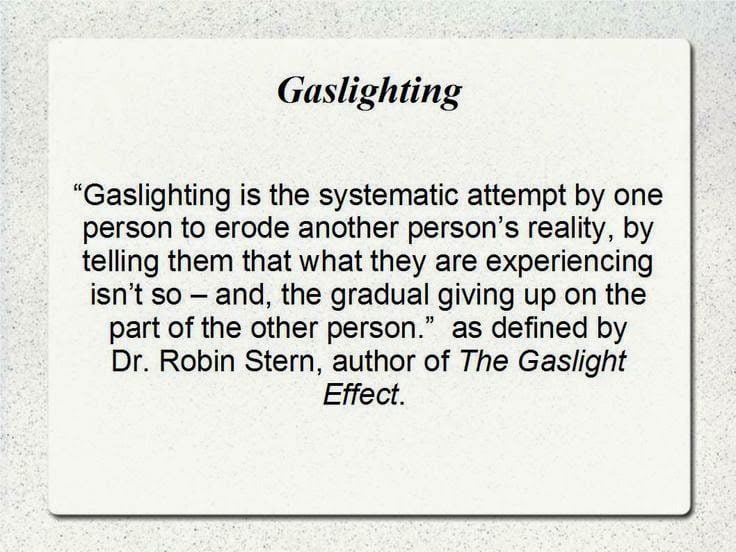In a diocesan bulletin, a priest writes about the way 'gaslighting' is used in the religious world. A word in vogue in present society and used often in the political world.
'Gaslighting' is psychological manipulation, a word that originated from a mystery novel written by a British play writer. In the play the husband causes the gas lights in the house to flicker and when the wife asks why he tells her it is all in her mind, causing her to doubt what she sees. It is abusive behavior but not necessarily always something the perpetrator does with evil motives as above.
Within Christianity, it appears when pastors, theologians, and churches use methods similar to brainwashing rather than teaching. But more frequently by those who ridicule religion seeing it as myth, and abuse of believers, deceiving them with the pie in the sky approach to reality. Disdainfully getting the believers to doubt themselves and their beliefs.
In the world of ideas, religion is a controversial topic, but most agree that the freedom to believe or not is an important value of democracy. However, believing in something that is not true is not helpful to the individual or society, and giving reasons for not believing is valid, respecting those with whom they disagree.
It's a fact that religion can rationalize almost everything. In large segments of the population, religion has justified almost all the evils seen in the world. With Christians, this happens when we close our eyes to the teaching of Jesus because of greed, pride, selfishness, fear, and ignorance.
Truth is what we all seek. As Christians, we believe the truth will make us free. Not all would agree and ask: What is truth? However for Christians, God is the truth, and the search gives joy.
There are those in society who call the Catholic Church a cult and show great animosity towards its teaching which they find offensive and express this strongly. They dislike the institution.
The church does see itself as an institution, an organization, and not only as a way of life or spirituality. Many have difficulty with this. Catholicism believes Jesus established a structure with a leader and members and gave them a job to do.
This community with its leader, 11 inner circle members, and disciples began the writing and selection of what is now called the New Testament. The infant church only possessed the Old Testament and it was not until centuries later that the community accepted the 27 books of our present New Testament and it was no easy task to decide what these books were to be. Is this not why many Catholics say it is the authority of the Church by which they accept the New Testament and not vice versa?
It is well, for us to remember that Jesus spoke Aramaic and the New Testament was written in Greek. The first community spoke Aramaic. The 'Holy Tradition' was passed on at first in Aramaic. This gives us something to think about.
Because of the controversy associated with religion and institutions, many like to see Christianity as a way of life, a spirituality, it is that but much more. Christianity began as a structure, an organization, an institution, grounded in history, open to the eyes of all—faults, sins, corruption, violence, and embarrassments galore is all there to easily see. It is a human institution that Jesus promised to be with to the end of time; he didn't promise purity and righteousness in everything: it's made up of humans, not angels. A community of believers always reforming, asking for forgiveness, and hoping to become holier.
Those who don't have the Church as their Mother don't have God as Father. This kind of thinking comes from the respect the church has for 'Holy Tradition'. How does one forget that it was this Holy Tradition that gave life to the church for at least 20 years but actually for much longer? History easily accessible to all keeps the church from becoming a cult.
In the digital age anyone who desires to find the facts and willingly spend time separating the likely from the unlikely and motivated by truth no matter what, will not necessarily be changed by what they find but have little reason for gaslighting the institutional church. Happy Birthday!

No comments:
Post a Comment